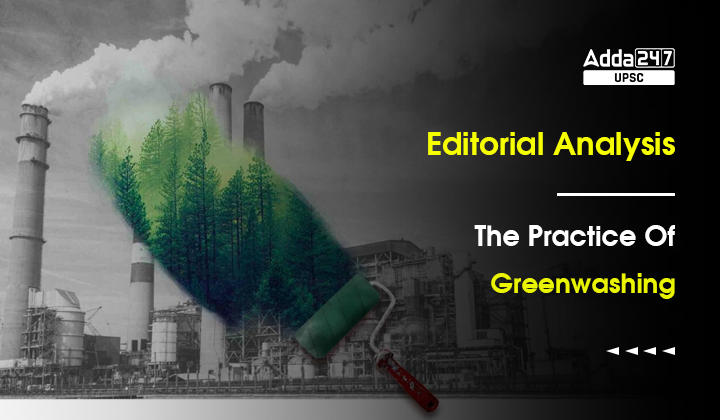Table of Contents
Editorial Analysis: The Practice Of Greenwashing ESG
In Today’s Editorial Analysis, ”The Practice Of Greenwashing ESG”, We Will Discuss: What Is Greenwashing?, How ESG is Related To Greenwashing?, Factors Contributing To Greenwashing?, How Regulators Handling Greenwashing?, etc.
Union Budget 2023-24, Key Provisions
Context
- There’s a growing trend among companies to play the ESG(Environmental, Social and Governance) card. They mislead investors, by using ESG just as a marketing tool instead of taking environment and society friendly steps. These deceiving practices, called greenwashing.
- There are many examples of how questionable governance standards can erode billions of dollars of investors’ wealth.
Key Highlights Of Union Economic Survey 2022-23
What Is Greenwashing?
- The term ‘greenwashing’ was coined by environmentalist Jay Westervelt in 1986 which refers to misleading advertisements or false claims by companies that suggest they are doing more for the environment than they actually are.
- So, Greenwashing is when companies make false or exaggerated claims to fool consumers into thinking their products or services benefit the environment.
- Such practices deceive customers with claims that are not backed by evidence and bear social, ethical and environmental repercussions.
- Greenwashing is becoming more prevalent and can be found in a variety of industries, including food and fashion as well as energy, electronics, and finance.
- For Example, the fast fashion industry has been a major culprit of this malpractice. They have often been found to use climate crisis as a means of marketing without pursuing a fundamental shift in its business model.
What Is Shree Anna Scheme In Union Budget 2023?
How ESG is Related To Greenwashing?
- ESG(Environmental, Social and Governance) is a set of standards measuring a business’s impact on society, the environment, and how transparent and accountable it is.
- Greenwashing is the practice of using marketing and PR tactics to overamplify a company’s ESG efforts for the purpose of gaining greater favor from consumers, investors, employees, etc.
India Needs Small Enterprises For Green Economy, The Hindu Editorial Analysis
Factors Contributing To Greenwashing?
Lack Of Clarity: The most significant loophole in sustainability is its lack of a clear, quantifiable definition. Terms such as ‘ethical’ or ‘eco-friendly’ have no legal significance. This encourages the lack of accountability of fashion brands.
Unavailability Of Data: Absence of empirical data and government-subsidised studies on the impact of Particular Industry on environment also poses a hurdle.
Lack Of Awareness: Another reason contributing to greenwashing is insufficient public awareness and education around the harmful practices the industry embraces, allowing companies to continue spewing false information.
Sustainability On Cards Only: Most Of The Businesses merely tack a ‘sustainable’ line onto their supply chain, which inherently is hypocritical. Moreover, it tricks customers into evaluating brands as more sustainable, simultaneously fuelling their business model.
The Hindu Editorial Analysis, Allocations For Science And Tech In Union Budget 2023-24
Big Brands Are The Real Culprits Of Greenwashing!
- Several independent brands are reinventing themselves as genuinely conscious of the environment. Big brands, however, use the vast profits generated through cheap, exploitative clothing to produce enormous marketing budgets to promote ‘green’ collections.
- Instead, they create an add-on sustainability agenda to their overall business model, which relies on exploitative and unsustainable supply chain, which ultimately cannot tackle the larger problems of Industrial Waste and Climate Change.
Free Ration for One Year To All NFSA Beneficiaries: Know Everything For UPSC
How Regulators Handling Greenwashing?
- Regulators across the world like India’s SEBI, have been increasingly focusing on tackling greenwashing, and are promoting transparency as ESG gaining prominence among investors.
- The Securities and Exchange Board of India, last year proposed tighter norms in a consultation paper on ESG to check greenwashing by companies.
- SEBI(India’s market regulator) noted that the lack of transparency in this emerging area raises an imperative need to ensure that the providers of such products operate in a transparent and regulated environment, balancing needs of all stakeholders.
The Hindu Editorial Analysis: Old Pension Scheme(OPS) vs New Pension Scheme(NPS)
How To Tackle The Practice Of Greenwashing?
How To Identify?
- To Observe Brands: While navigating and identifying insidious greenwashing can be overwhelmingly difficult, a fundamental rule of thumb would be to see whether a brand promotes sustainability as an add-on rather than a core to its business model.
- To Scientifically Analyse: One needs to look out for numbers, including facts and figures backed by science instead of vague words. For instance, one could question what percentage of a certain brand’s ‘sustainably made’ or ‘eco-friendly’ products are made with recycled materials or what quantifiable objectives have these brands listed publicly.
How To Deal?
- Availability Of Data: If comprehensive public disclosures and data are made available, investors will be able to interpret this data effectively, develop benchmarks, and objectively assess performance with the help of ESG ratings.
- ESG Ratings: ESG Ratings is one of the most significant instruments in eliminating information asymmetry. It is very important that ESG Rating agencies are independent and unbiased.
Way Forward
- ESG framework, along with tools such as ESG ratings, provides a safeguard for investors to assess risks.
- SEBI is implementing safeguards to ensure investors are protected from ESG risks i.e. Greenwashing.
- The recent initiatives of SEBI include BRSR (Business Responsibility and Sustainability Report) that ensures investors access standardised disclosures on ESG parameters.
- SEBI has also proposed an emerging market-specific approach for ESG Ratings Providers (ERPs) who need to consider India-specific standards.
Conclusion
The risks of greenwashing ESG will exist. In that case, Data-backed, reliable ESG insights are the need of the hour.



 TSPSC Group 1 Question Paper 2024, Downl...
TSPSC Group 1 Question Paper 2024, Downl...
 TSPSC Group 1 Answer key 2024 Out, Downl...
TSPSC Group 1 Answer key 2024 Out, Downl...
 UPSC Prelims 2024 Question Paper, Downlo...
UPSC Prelims 2024 Question Paper, Downlo...




